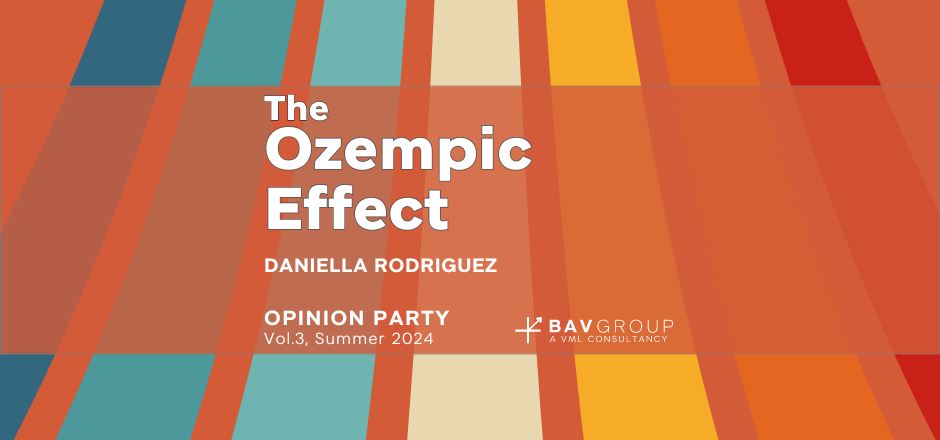The Ozempic Effect
08.20.2024

In 2023, Ozempic, a groundbreaking weight loss drug, took the world by storm. Celebrities flaunted their slimmed-down figures, and the drug dominated TV screens and Instagram feeds. But Ozempic's impact goes beyond Hollywood trends – it represents a seismic shift in the way we approach weight loss and diet culture. This phenomenon has prompted a reevaluation of diet culture and weight loss branding, and it's time to explore how we got here and where we're headed.
The Dieting Rollercoaster
The weight loss industry has long been characterized by the "Biggest Loser" mentality, promoting extreme measures and self-punishment. From fad diets to juice cleanses, consumers have been subjected to conflicting messages and unsustainable practices. Celebrity endorsements and the rise of social media have only intensified this tumultuous landscape. Now there’s Ozempic, which targets the physiological factors that contribute to weight gain and the conversation is shifting from "willpower and deprivation" to overall health and well-being. This represents a significant change in weight loss branding.
A Game-Changer in Weight Loss Branding
Ozempic, a GLP-1 receptor agonist, represents a new approach to weight loss, characterized by compassion and a shift towards medical assistance. As the perception of weight loss drugs evolves, they are increasingly seen as valuable tools in the fight against obesity. Even Oprah shifted from championing Weight Watchers to embracing Ozempic, highlighting this paradigm shift.
As the industry evolves, it is crucial to examine the long-term implications for consumers and brands. While newfound compassion is welcome, we must remain vigilant against the potential exploitation of insecurities. Brands should advocate for a holistic approach, encompassing physical, mental, and socioeconomic factors, and integrate elements from the "Health at Every Size" (HAES) movement to promote inclusivity and body positivity. Prioritizing long-term health and well-being, transparency, realistic expectations, and healthy habits is essential for brands adapting to this changing landscape.
The Future
The Ozempic effect has catalyzed a transformative shift in weight loss branding, challenging the industry to adopt a more compassionate and comprehensive approach to weight management. As we navigate this new terrain, it is essential to prioritize the well-being of consumers while holding brands accountable for their messaging and practices. By embracing a holistic perspective and promoting inclusivity, we can pave the way for a more positive and sustainable future in the weight loss industry.
Want to better understand how your can transform an entire category?
Contact us to schedule a 30 minute complimentary consultation.
Author: Daniella Rodriguez
Manager, Strategy & Insights
Daniella joined BAV Group in 2020, working to help clients leverage BAV Group's services. Prior to joining BAV group Daniella had worked in content strategy and consumer insights for the television and film industry. Daniella has a strong ambition to leverage data creatively so to develop innovative storytelling that enhances brand strategy. She recently graduated from the University of Chicago with a B.A in Sociology specializing in psycho-sociology. For her thesis she conducted research on the role and effects of gender in pharmaceutical marketing. Daniella is fluent in Spanish and amateur oil painter.
Connect with Daniella on LinkedIn
Opinion Party (Vol 3): Summer Beach Reads
This article is from the third volume of "Opinion Party" from BAV Group, a collection of points of view that focused on embracing the unknown, trusting ourselves and others, and ultimately a body of work that helps us all to connect around topics that unite us rather than divide us. Explore this, and the rest of the articles, to see how our authors have taken their unique experiences and written informative and timely pieces on the intersection of brands and belonging in today’s culture.
